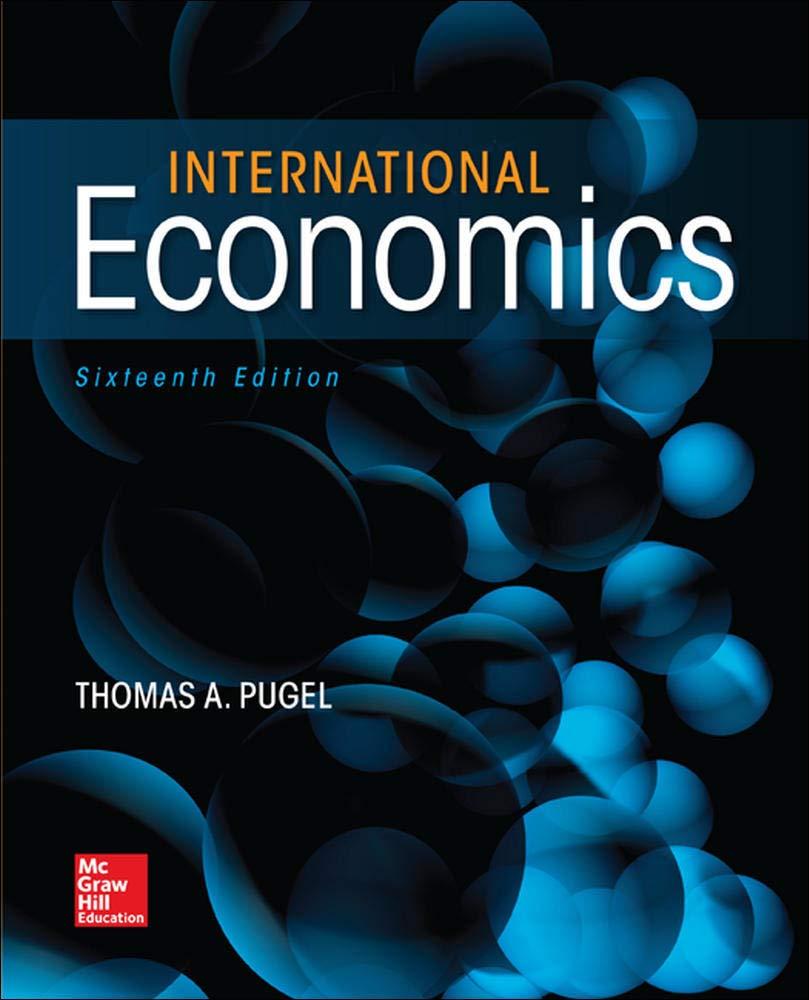Question
discuss below questions 1. (a) (i) Outline four factors that determine the supply of a good or service. (ii) Explain the difference between a movement
discuss below questions
1. (a) (i) Outline four factors that determine the supply of a good or service.
(ii) Explain the difference between a movement along a supply curve and a shift in a
supply curve. Use appropriate diagrams to illustrate your answer.
[35]
(b) Read the following statements and indicate if they are TRUE or FALSE.
Explain your answer in each case.
(i) The cross price elasticity of demand for substitute goods has a negative value.
(ii) Price Elasticity of Demand (PED) tends to be more elastic in the long-run than in the
short-run.
(iii) When demand for a good is price inelastic, a reduction in price will increase total sales
revenue.
(iv) Income elasticity of demand (YED) for luxury goods is positive.
[24]
(c) Using the concepts of demand and supply explain, with the aid of a labelled diagram, how a
shortage of tickets for a major concert may arise. The concert venue has a maximum capacity
of 30,000 people.
[16]
[75 marks]
2. Cadbury, Mars and Nestl dominate the chocolate industry in the European Union.
(a) (i) State a market structure which most closely reflects the situation above, giving a
reason for your answer.
(ii) Outline two other key characteristics of this market structure.
(iii) Explain, with the aid of a labelled diagram, the likely shape of the demand curve in this
market structure.
[35]
(b) (i) If a large US chocolate manufacturer entered the EU chocolate market, outline the possible
economic impacts of greater competition in this market.
(ii) Outline two factors which could make it difficult for this US chocolate manufacturer
to enter the EU chocolate market.
[25]
(c) Explain why small firms succeed in some markets while other markets are dominated by
large firms.
3. (a) Explain the following terms in relation to the factor of production labour.
(i) Participation rate
(ii) Real wages
(iii) Labour Productivity
(iv) Derived demand [20]
(b) (i) Discuss the factors that impact on the supply of labour.
(ii) Outline two challenges currently facing the Irish labour market and state one
appropriate government policy response for each challenge identified.
[35]
(c) Discuss reasons why different workers are paid different wage rates. [20]
[75 marks]
4. (a) (i) Distinguish between the short-run and the long-run production periods.
(ii) In the short-run firms may stay in the industry even if they are making a loss.
Explain this statement. [15]
(b) (i) Explain the terms marginal revenue and marginal cost.
The table below shows costs and revenue data of a firm.
Output Price () Total Revenue () Total Cost ()
1 20 20 42
2 20 40 60
3 20 60 77
4 20 80 97
5 20 100 130
Use the data in the table above to:
(ii) Calculate the marginal revenue and marginal cost at each output level.
Show your workings.
(iii) Draw one graph showing the marginal revenue and marginal cost and identify the
profit-maximising level of output for this firm. Explain your answer.
[30]
(c) "Overall Ireland's improving competitiveness performance over the period 2011 to 2014 has
been central to the recovery in employment and economic growth."
(Source: The National Competitiveness Council, December 2015)
(i) Outline the factors that influence the competitiveness of firms in Ireland.
(ii) Discuss three policies that the Irish government could consider to improve the
competitiveness of firms in Ireland.
5. (a) (i) Define the term full employment.
(ii) Discuss the possible economic benefits and economic challenges of full employment in an
economy.
[25]
(b) Use the information in the table to answer the questions below.
Marginal propensity to consume (MPC) 0.8
Marginal propensity to import (MPM) 0.2
Current equilibrium level of national income 500m
Level of national income that would give full employment 620m
(i) Define the term marginal propensity to save (MPS).
(ii) Calculate the MPS for this economy illustrated in the table above.
(iii) Calculate the value of the multiplier in this open economy.
(iv) How much will the government have to inject into this economy if it wants the economy to
operate at its full employment level? Show your workings.
[30]
(c) Explain how Ireland's Gross Domestic Product (GDP) could be affected by any two of the
following.
(i) An increase in Child Benefit payments.
(ii) A foreign-owned company, operating in Ireland, sends back to their home country all the
profits they have earned in Ireland.
(iii) An oil spill off the Irish coast costs the Irish Government significant clean-up costs.
[20]
[75 marks]
6. (a) (i) Explain the term exchange rate.
(ii) Outline the possible economic effects on the Irish economy of an appreciation in the value
of the euro against the US $. [25]
(b) "The Balance of Payments (BOP) Current Account had a surplus of 2.7 billion in the second
quarter of 2015, equivalent to 5.2% of quarterly GDP."
(Source: Nevin Economic Research Institute (NERI), Autumn 2015)
(i) Describe the main elements of Ireland's balance of payments (BOP) account.
(ii) Explain what is meant by a surplus on the BOP current account.
(iii) Can a surplus on the BOP current account pose problems for an economy?
Explain your answer.
[30]
(c) "Irish SMEs (Small and Medium Enterprises) are too dependent on the home market, Europe
warns."
(Source: Irish Independent, November 2015)
Outline the benefits and challenges for Irish SMEs operating in foreign markets.
[20]
[
Step by Step Solution
There are 3 Steps involved in it
Step: 1

Get Instant Access to Expert-Tailored Solutions
See step-by-step solutions with expert insights and AI powered tools for academic success
Step: 2

Step: 3

Ace Your Homework with AI
Get the answers you need in no time with our AI-driven, step-by-step assistance
Get Started


